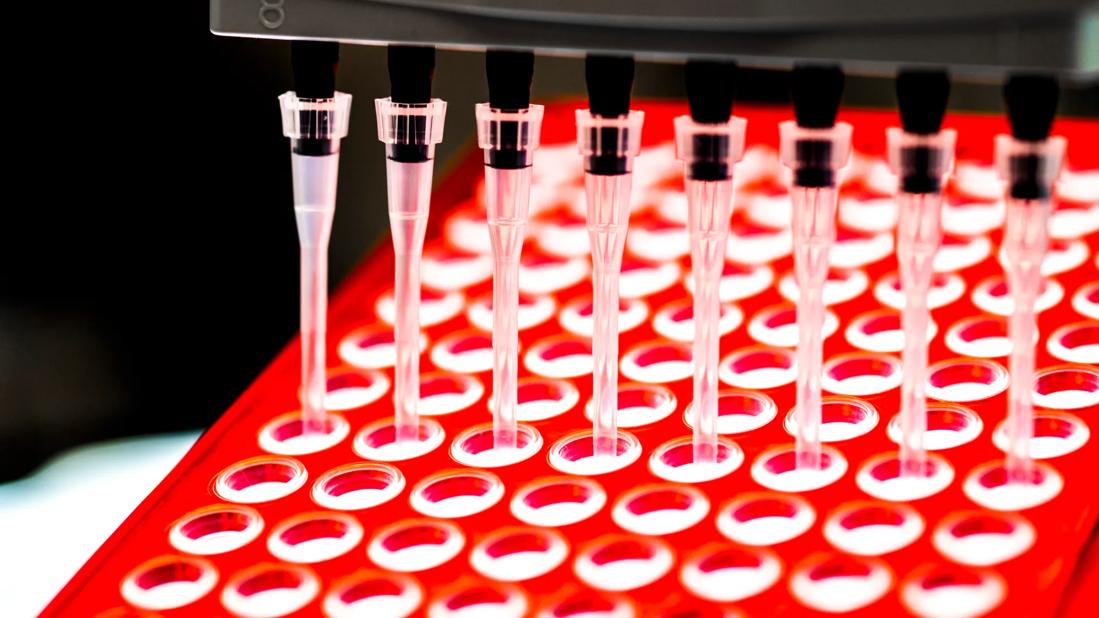Cleveland Clinic-developed test identifies variant of HSD3B1 gene

Image content: This image is available to view online.
View image online (https://assets.clevelandclinic.org/transform/49da2216-8738-436a-8fdb-1915e3d6e017/LRI_3153408_08-23-22_146_LDJ-jpg)
Lab test
A clinical laboratory test that may inform more rational and, thus, more effective treatment for advanced prostate cancer has been developed at Cleveland Clinic.
Advertisement
Cleveland Clinic is a non-profit academic medical center. Advertising on our site helps support our mission. We do not endorse non-Cleveland Clinic products or services. Policy
The genetic test was conceptualized by Cleveland Clinic researchers and validated and made available by the Molecular Pathology Section within Cleveland Clinic’s Pathology and Laboratory Medicine Institute. The test is used to interrogate the HSD3B1 gene and determine if a prostate cancer patient has inherited the adrenal-permissive (1245C) or adrenal-restrictive (1245A) allele.
“This is a specific testosterone-related genetic abnormality,” says medical oncologist and physician-researcher Nima Sharifi, MD, of Cleveland Clinic’s Lerner Research Institute, Glickman Urological & Kidney Institute and Taussig Cancer Institute.
“Men who inherit the androgen-permissive allele have more robust or active conversion from DHEA to testosterone or androgens, which is associated with quicker progression and decreased overall survival in prostate cancer patients,” he says.
As Dr. Sharifi explains, there are two forms of the allele; one that impedes conversion (restrictive) and the other that enhances it (permissive). With the latter form, in essence, the floodgates are open. Patients’ bodies rapidly turn adrenal dehydroepiandrosterone (DHEA) to 5α-dihydrotestosterone (DHT). That, in turn, triggers clinical progression of prostate cancer to castration-resistant disease.
The development of the test is an outgrowth of more than seven years of research at Cleveland Clinic, which was documented in a recent review article in Endocrinology. It all stemmed from a basic observation in the lab about how genetics drive metabolism, or synthesis of androgens, leading to better or worse outcomes in prostate cancer.
Advertisement
Dr. Sharifi and colleagues went on to perform the first prospective clinical trial validation of the relationship between HSD3B1 status and clinical outcomes. It showed that patients with metastatic prostate cancer who have an adrenal-permissive variant of HSD3B1 are more likely to have aggressive, early castration-resistant disease and shorter survival. That work — the first prospective clinical trial validation of the relationship between HSD3B1 status and clinical outcomes — pointed the way to development of the new genetic test.
“Our research identified the first gain-of-function genetic mutation that increases the conversion of precursor steroids to DHT, permitting tumors to grow in the absence of gonadal testosterone,” says Dr. Sharifi. The adrenal-permissive HSD3B1 variant (1245C) allele encodes a stable form of the 3βHSD1 enzyme, which supports rapid conversion from DHEA to DHT and resultant high levels of DHT in tumor tissue. The stable enzyme accumulation increases androgen synthesis, enhances androgen receptor activation, thus, accelerating tumor proliferation.
The team also has performed retrospective studies on men with nonmetastatic and metastatic prostate cancer and showed an association between the adrenal-permissive variant and accelerated time to development of castration-resistant disease, reduced metastasis-free survival, and reduced overall survival.
This year, they published the first prospective research in this area, which supports the importance of HSD3B1 genotyping and clinical outcomes. The phase 3 trial of castration with or without docetaxel treatment in men with newly diagnosed metastatic prostate cancer showed significantly shorter time to castration-resistant disease and significantly lower survival in men with low-volume disease who had the permissive allele.
Advertisement
“The clinical significance of this genetic variant, which has a disproportionately higher frequency in white men, has been independently validated multiple times,” says Dr. Sharifi. “Our latest findings suggest that the HSD3B1 genotype can be used to risk stratify white men with low-volume metastatic prostate cancer.”
Dr. Sharifi and his team shared these findings with members of the molecular pathology laboratory, and the team designed and launched an analytically validated HSD3B1 genotyping laboratory-developed test. The test is available today for ordering by physicians who manage prostate cancer patients.
Daniel H. Farkas, PhD, HCLD, Section Head, Molecular Pathology in Cleveland Clinic’s Pathology and Laboratory Medicine Institute, notes that the partnership facilitated a true example of translational research. “A hypothesis was developed in the research environment, clinically validated in a trial, and the business-end of genotyping was analytically validated and launched in the clinical laboratory for use by physicians in managing their patients.”
He adds, “Together, we partnered in a bench-to-bedside advance that demonstrates the very best of how Cleveland Clinic practices precision and genomic medicine.”
The Molecular Pathology Section has dramatically expanded its capacity in recent years for precision medicine test offerings that use genotyping and next-generation sequencing to support molecular oncology applications, thus both teams were well-positioned to collaborate on this initiative.
Advertisement
Dr. Sharifi cautions that how to best use the information from the test to inform clinical decisions is still “not crystal clear,” but he expects that with time and experience, researchers and clinicians will gain a better understanding of its applications.
“It’s very clear that two men who have prostate cancer may have very different diseases, driven in major part by their genetics and the genetics of their tumors,” says Dr. Sharifi. The wave of the future, he believes, is therapies that are increasingly geared toward personalization and that leverage the interrelationship of hormonal and genetic regulation.
Advertisement
Advertisement
Combination therapy improves outcomes, but lobular patients still do worse overall than ductal counterparts
Bringing empathy and evidence-based practice to addiction medicine
Supplemental screening for dense breasts
Combining advanced imaging with targeted therapy in prostate cancer and neuroendocrine tumors
Early results show strong clinical benefit rates
The shifting role of cell therapy and steroids in the relapsed/refractory setting
Radiation therapy helped shrink hand nodules and improve functionality
Standard of care is linked to better outcomes, but disease recurrence and other risk factors often drive alternative approaches